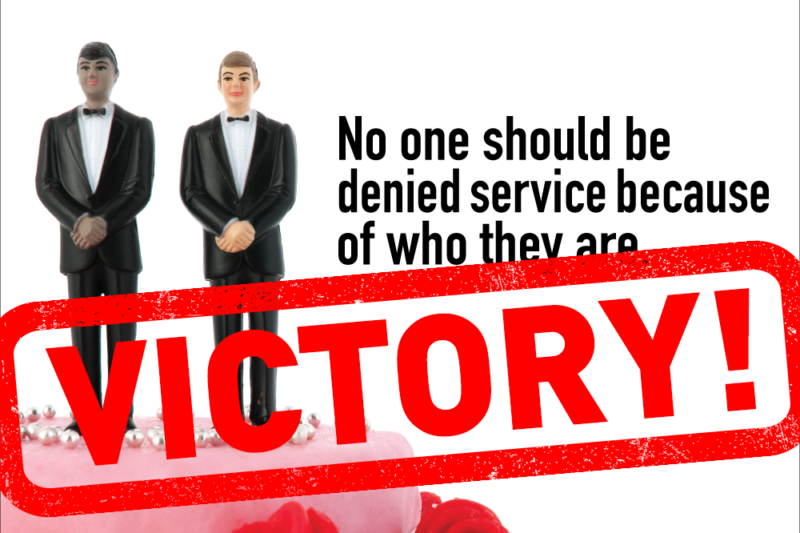Another Day, Another Victory: Courts Are Weighing Religious Claims to Discriminate and Finding Them Wanting


In just the past 24 hours, two courts reaffirmed that religious beliefs can’t justify discrimination against lesbians and gay men. In the wake of the Supreme Court decision that same-sex couples have the same freedom to marry that straight couples do, a few opponents of marriage equality continue to try to use their religious beliefs as an excuse to discriminate against us and our marriages. In both of these ACLU cases, courts have said nope, that’s not okay.
The first case involves Kim Davis, clerk of Rowan County, Kentucky. Within hours of the Supreme Court’s decision in Obergefell v. Hodges, Davis announced that she would stop issuing marriage licenses to any couples, straight or gay, because she has religious objections to marriage for same-sex couples. Four couples — two gay and two straight — sued Davis, saying that her personal religious beliefs didn’t excuse her from doing her job.
In a decision issued yesterday, federal District Judge David Bunning agreed. He explained that “Davis is certainly free to disagree with the Court’s decision [about marriage], as many Americans likely do, but that does not excuse her from complying with it.” Signing a marriage license “does not require the county clerk to condone or endorse same-sex marriage on religious or moral grounds. It simply asks the county clerk to certify that . . . the couple is qualified to marry under Kentucky law.”
Religious freedom is central to American liberty, but it’s simply not infringed here.
The second case involves Charlie Craig and David Mullins, who took Charlie’s mom on an outing near their home in Colorado to look at wedding cakes. After the owner of Masterpiece Cakeshop learned that the cake was for the two guys, he said he just doesn’t do wedding cakes for gay people. That frank admission violates longstanding Colorado civil rights law, which says that businesses that are open to the public must serve everyone, regardless of race, sex, religion, or sexual orientation. Charlie and David sued, making clear that it’s not about the cake — it’s about being told “we don’t serve your kind here.”
Today the Colorado Court of Appeals agreed with Charlie and David, ruling that the business owner’s religious beliefs don’t give him a license to discriminate. The court explained, “Masterpiece remains free to continue espousing its religious beliefs, including its opposition to same-sex marriage. However, if it wishes to operate as a public accommodation and conduct business within the State of Colorado, [the state’s law against discrimination] prohibits it from picking and choosing its customers based on their sexual orientation.”
These cases extend an almost unbroken line of court cases ruling for equality and against the use of religion to discriminate. But they won’t be the end of our opponents’ efforts to undermine the freedom to marry and LGBT equality. They are turning increasingly to state legislatures and to Congress to secure the right to discriminate against LGBT people, women, and others.
For example, the First Amendment Defense Act, a bill introduced in Congress, would legalize discrimination in the name of religion by people all across the country. The bill was put on hold earlier this summer after word got out about how terrible a law it would be. But we expect it to come back this fall, and if the initial support it had from conservatives was any indication, we can bet it’s not going to die without a fight.
Make no mistake: That bill is this spring’s Indiana situation on steroids, and any elected official who watched Gov. Pence’s approval ratings plummet because of his support for discrimination should think twice about pushing this so-called religious liberty bill. Bills like this one may pop up in some of the states too, and we should be prepared to beat back bad laws that will undermine equality for many in America.
So far, though, equality is doing very well in the courts, which are refusing to expand religious liberty to the point that it would justify discrimination and harming third parties. For that, we are grateful. One can only hope that legislators learn the constitutional lessons coming from the courts.

